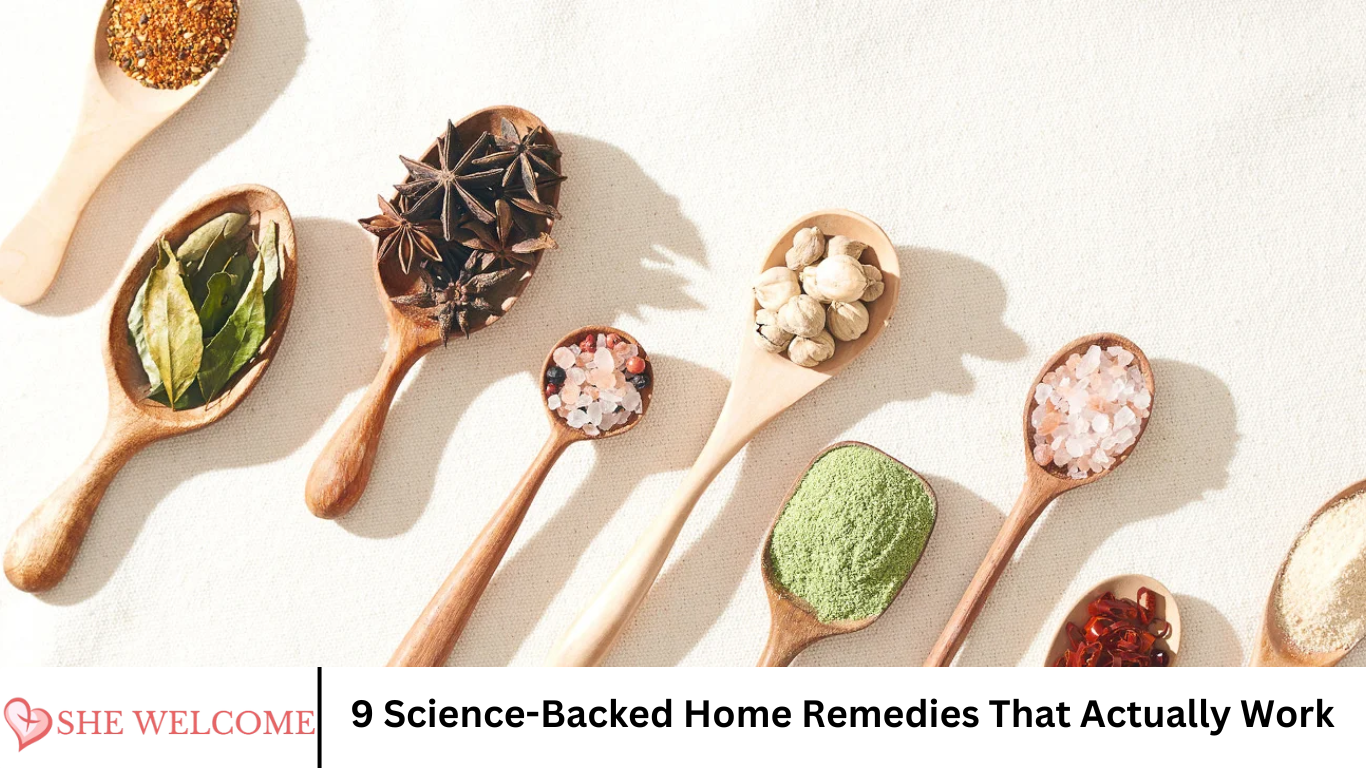Home remedies have been passed down for generations — from grandma’s ginger tea to soothe a sore throat, to warm salt water gargles for mouth pain. But not all natural treatments are based on superstition or anecdote.
In fact, modern research is catching up with ancient wisdom, confirming that some remedies truly have real physiological effects. Here are 9 home remedies backed by science that you can feel good about using — with evidence to support them.
More Read: The Psychology Behind Mindfulness
1. Honey for Coughs and Sore Throats
Keyword focus: natural remedy for cough, honey for sore throat
Honey has been used for centuries as a remedy for coughs and sore throats — and now, science supports its soothing powers. Studies have shown that honey can be more effective than over-the-counter cough suppressants like dextromethorphan in reducing nighttime coughing in children.
How It Works:
Honey coats the throat, offering both anti-inflammatory and antimicrobial effects, which help reduce irritation and fight minor infections.
Research Says:
A 2012 study published in Pediatrics found that a single dose of honey before bed reduced cough frequency and improved sleep in children with upper respiratory infections.
✅ Tip: Use raw, organic honey (not for children under 1 year old due to the risk of botulism).
2. Ginger for Nausea and Indigestion
Keyword focus: ginger for nausea, natural remedy for indigestion
Ginger root has long been used in traditional Chinese and Ayurvedic medicine, and modern science confirms its effectiveness — especially for nausea relief.
How It Works:
Ginger contains compounds like gingerol and shogaol, which can enhance gastrointestinal motility, helping food move more efficiently through the stomach and intestines.
Research Says:
Multiple clinical studies show that ginger is effective in reducing nausea related to pregnancy, motion sickness, and chemotherapy.
✅ Tip: Sip ginger tea, chew raw ginger, or take it in capsule form (about 500–1000 mg per day for nausea relief).
3. Peppermint Oil for Headaches and IBS
Keyword focus: peppermint oil for headaches, peppermint for IBS
If you suffer from tension headaches or irritable bowel syndrome (IBS), peppermint oil might offer natural relief.
How It Works:
Menthol, the active compound in peppermint oil, has a cooling effect that can relax smooth muscles and relieve pain signals in the body.
Research Says:
A 2016 review in Pain found that topical peppermint oil significantly reduced headache symptoms. Another study published in BMJ concluded that enteric-coated peppermint oil capsules effectively eased IBS symptoms, such as bloating and abdominal pain.
✅ Tip: For headaches, apply diluted peppermint oil to the temples. For IBS, take it as directed in capsule form.
4. Epsom Salt Baths for Muscle Soreness
Keyword focus: Epsom salt for sore muscles, natural muscle recovery
After a workout or a long day, an Epsom salt bath (magnesium sulfate) can do wonders for muscle tension and soreness.
How It Works:
Magnesium absorbed through the skin may help reduce inflammation and relax muscles. While transdermal absorption is still debated, many users report noticeable relief.
Research Says:
A small 2017 study found that magnesium sulfate baths may improve magnesium levels in the body, and anecdotal reports consistently support its use for post-exercise recovery.
✅ Tip: Add 1–2 cups of Epsom salt to a warm bath and soak for 20–30 minutes.
5. Chamomile Tea for Sleep and Anxiety
Keyword focus: chamomile for sleep, natural anxiety relief
Chamomile isn’t just a calming evening ritual — it’s also a scientifically supported herbal remedy for insomnia and mild anxiety.
How It Works:
Chamomile contains apigenin, a flavonoid that binds to GABA receptors in the brain — similar to anti-anxiety medications like benzodiazepines.
Research Says:
A 2016 study in Phytomedicine showed that chamomile extract significantly reduced moderate to severe generalized anxiety disorder (GAD) symptoms. Another study found improved sleep quality in postpartum women drinking chamomile tea.
✅ Tip: Drink one cup of chamomile tea 30–60 minutes before bed to promote relaxation and sleep.
6. Apple Cider Vinegar for Blood Sugar Control
Keyword focus: apple cider vinegar for blood sugar, home remedy for diabetes
Apple cider vinegar (ACV) is one of the most popular home remedies — and yes, it does have some science-backed benefits, especially for blood sugar management.
How It Works:
Acetic acid in vinegar may slow carbohydrate digestion and improve insulin sensitivity, leading to better blood sugar control after meals.
Research Says:
A study published in Diabetes Care found that consuming vinegar before meals improved insulin sensitivity by 19–34% in people with insulin resistance or type 2 diabetes.
✅ Tip: Mix 1 tablespoon of raw ACV in water before high-carb meals (consult your doctor if you’re diabetic or on medication).
7. Turmeric for Inflammation and Joint Pain
Keyword focus: turmeric for inflammation, natural remedy for arthritis
Turmeric, the golden spice found in many Indian dishes, contains curcumin, a powerful antioxidant with anti-inflammatory properties.
How It Works:
Curcumin blocks inflammatory pathways in the body and may reduce joint pain and swelling, especially in people with arthritis.
Research Says:
A 2014 study in Clinical Interventions in Aging found that turmeric supplements were as effective as ibuprofen in reducing pain in people with knee osteoarthritis, with fewer side effects.
✅ Tip: For best absorption, take turmeric with black pepper (which contains piperine) or in supplement form (500–1000 mg curcumin daily).
8. Garlic for Immune Support and Heart Health
Keyword focus: garlic for immunity, garlic for blood pressure
Garlic is more than a flavor-booster — it’s also a powerful medicinal herb shown to boost immunity and support cardiovascular health.
How It Works:
Allicin, the active compound in garlic, has antiviral, antibacterial, and antifungal properties, and also helps lower blood pressure and cholesterol.
Research Says:
A 2020 meta-analysis found that garlic supplementation significantly reduced both systolic and diastolic blood pressure in people with hypertension. Other studies confirm its immune-boosting potential.
✅ Tip: Eat 1–2 raw garlic cloves per day or use aged garlic supplements for a milder option.
9. Salt Water Gargle for Sore Throats and Oral Health
Keyword focus: salt water gargle sore throat, natural remedy for oral hygiene
This simple home remedy is as old as time — and there’s strong science behind it.
How It Works:
Gargling with salt water creates an osmotic effect that draws moisture out of bacteria cells, reducing inflammation and preventing infection.
Research Says:
According to the Mayo Clinic and other medical institutions, saltwater gargles can ease sore throat discomfort and reduce bacteria in the mouth, promoting faster healing.
✅ Tip: Mix 1/2 teaspoon of salt in a cup of warm water and gargle 2–3 times per day.
Frequently Asked Question
Are home remedies really effective?
Yes, some home remedies are backed by scientific research. While not every natural remedy holds up under scrutiny, several—like honey for coughs or ginger for nausea—have been clinically tested and shown to offer real health benefits. However, effectiveness depends on correct usage, dosage, and individual health conditions.
Which home remedies have the strongest scientific support?
The most scientifically supported home remedies include:
- Honey for cough relief
- Ginger for nausea and digestion
- Turmeric for inflammation and joint pain
- Chamomile tea for sleep and anxiety
- Peppermint oil for IBS and headaches
These remedies are supported by clinical trials and peer-reviewed studies.
Can I use these remedies alongside prescription medications?
In many cases, yes—but consult your healthcare provider first. Some natural remedies may interact with medications. For example, turmeric and garlic can affect blood clotting, and apple cider vinegar can interfere with blood sugar medications.
Are there any risks or side effects with natural home remedies?
Yes, even natural remedies can cause side effects. For example:
- Too much garlic can upset the stomach
- Excessive ACV can erode tooth enamel
- Undiluted essential oils may irritate skin
- Chamomile may cause allergic reactions in those with ragweed allergies
Always follow recommended dosages and monitor how your body reacts.
Are these remedies safe for children?
Some are safe, others are not. For instance:
- Honey should not be given to children under 1 year old due to botulism risk
- Chamomile tea and ginger are generally safe in small amounts
- Essential oils should be used with caution in kids
Always consult a pediatrician before trying any home remedy on a child.
How long does it take for home remedies to work?
It depends on the remedy and the condition. Some, like peppermint oil for headaches or ginger for nausea, can work within minutes to hours. Others, such as turmeric for joint pain, may take days or weeks of consistent use to show noticeable results.
Can I replace my medications with home remedies?
No, not without professional medical guidance. While some remedies can complement traditional treatments, they should not be used as substitutes for prescribed medications, especially for chronic or serious conditions like diabetes, hypertension, or depression.
Conclusion
Home remedies can be powerful allies — when they’re used responsibly and backed by evidence. While natural remedies can’t replace medical treatment in all cases, the nine above have stood up to scientific scrutiny and offer a safe, accessible way to support your health. Always consult with your healthcare provider before starting any new remedy, especially if you’re pregnant, nursing, or managing a chronic condition.


